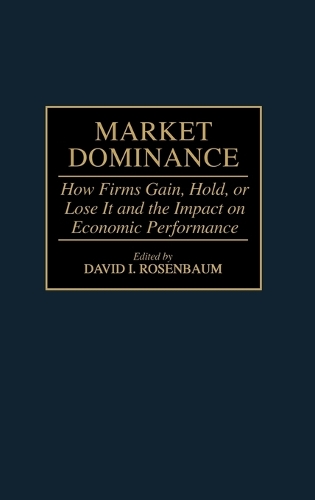
Market Dominance: How Firms Gain, Hold, or Lose It and the Impact on Economic Performance
(Hardback)
Publishing Details
Market Dominance: How Firms Gain, Hold, or Lose It and the Impact on Economic Performance
By (Author) David Rosenbaum
Bloomsbury Publishing PLC
Praeger Publishers Inc
26th May 1998
United States
Classifications
Tertiary Education
Non Fiction
Microeconomics
Economic theory and philosophy
Business strategy
338.5
Physical Properties
Hardback
280
Description
Economic theorizing suggests that firms can acquire and maintain market dominance in a number of ways. Some economists argue that firms attain dominance only by being relatively more efficient than their rivals and retain leadership only by staying more efficient than their rivals. Others argue that efficiency is not the only source of dominance and that leaders can retain preeminence even if they are inefficient. This book attempts to sort out the relevant points by exploring market dominance experienced by firms in ten different industries. It examines factors that led to acquiring, holding and in some cases losing dominance and asks whether those factors were consistent with economic efficiency. The results suggest that both schools make valid points. Generally, firms that rose to dominance were market pioneers and did so using economically-efficient strategies. In some cases, however, firms rose to dominance using inefficient strategies. Once they reached their ascendance, these firms engaged in a number of strategies, some efficient, others inefficient, to maintain their dominant positions. Most of the firms examined eventually lost their dominance. In some cases, the market evolved too rapidly for any firm to maintain control. In other cases the fall was ushered along by federal antitrust and trade policy. In still other industries, it was due either to poor management or the firm becoming inefficient. However, even when some of these dominant firms became inefficient, the market system worked only very slowly to remove them. The analysis has specific implications for antitrust policies toward dominant firms. Because the sources and consequences of dominance can be varied, neither a ^Ilaissez faire^R policy in favor nor a ^Iper se^R injunction against dominance is called for. A reasoned approach, tempered by underlying market conditions, is warranted toward the strategies used to acquire and maintain dominance.
Reviews
[A]n interesting collection of essays which suggest that dominant firms should be responsive to reasonable rules of competition which, left unenforced by the "invisible hand" of the domestic market, should be exacted by foreign competitors or promulgated by government policy and law.-H-Net Reviews
Recommended for public and academic library collections, lower-division undergraduate through graduate.-Choice
These concise and brief case studies provide cogent summaries of the rise and fall of very big business within a market context....Althogether, this is an interesting collection of essays which suggests that dominant firms should be responsive to reasonable rules of competition which, left unenforced by the "invisible hand" of the domestic market, should be exacted by foreign competitors or promulgated by government policy and law.-H-Net Reviews in the Humanities & Social Sciences
"An interesting collection of essays which suggest that dominant firms should be responsive to reasonable rules of competition which, left unenforced by the "invisible hand" of the domestic market, should be exacted by foreign competitors or promulgated by government policy and law."-H-Net Reviews
"[A]n interesting collection of essays which suggest that dominant firms should be responsive to reasonable rules of competition which, left unenforced by the "invisible hand" of the domestic market, should be exacted by foreign competitors or promulgated by government policy and law."-H-Net Reviews
"Recommended for public and academic library collections, lower-division undergraduate through graduate."-Choice
"These concise and brief case studies provide cogent summaries of the rise and fall of very big business within a market context....Althogether, this is an interesting collection of essays which suggests that dominant firms should be responsive to reasonable rules of competition which, left unenforced by the "invisible hand" of the domestic market, should be exacted by foreign competitors or promulgated by government policy and law."-H-Net Reviews in the Humanities & Social Sciences
Author Bio
DAVID I. ROSENBAUM is Professor of Economics at the University of Nebraska-Lincoln. He is the author of numerous articles on industrial organization, market evolution, and strategic competition.
